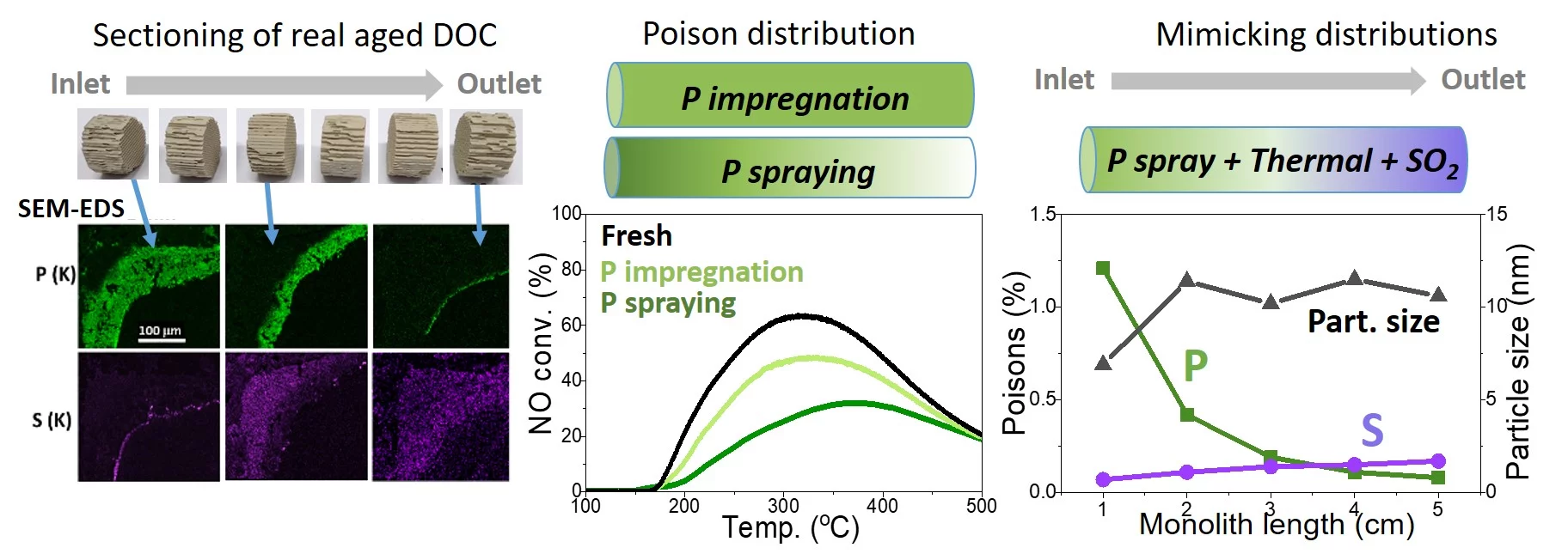To meet current emission regulations, it is essential to understand and predict the long-term durability of Diesel oxidation catalysts (DOC) during driving. We have closely collaborated with a diesel engine manufacturer and a catalyst supplier within the framework of a project of the Swiss Innovation Agency in order to unravel the phenomena responsible for DOC deterioration during vehicle operation. Initially, characterisation was performed on a DOC monolith extracted from a Diesel truck with 288,000 km. The study allowed the identification of two main deactivating agents: chemical poisoning (due to accumulation of P and S compounds from lube oil and fuel impurities) and noble metal sintering (due to exotherms occurring during driving). An in-depth analysis of six consecutive segments along the monolith revealed that P accumulation takes place preferentially in the inlet and in the top region of the washcoat, while S exhibits a reversed distribution. In combination with thermal effects, the distribution of P is believed to influence the size of noble metal particles along the monolith. The radial and axial gradients of the poisons as well as the strong relationship between the different deactivating parameters illustrate the complexity of DOC aging phenomena and the challenge to perform realistic laboratory-based predictions of catalyst durability.
In the second part of the project focusing on artificial catalyst aging, the unused DOC was exposed to sequential poisoning and thermal treatments. Chemical poisoning was obtained by spraying a solution of the P precursor onto the catalyst and by adding SO2 to the feed gas. The conditions of the treatments were optimised to mimic – as close as practically possible – the poison content/distribution along the length and the thickness of the washcoat as well as the noble metal particle sizes observed in vehicle aged DOC. This approach allowed evaluating the individual impact of each treatment while setting the basis for future protocols for lab scale durability predictions.
Read further here.
Contact
Dr Davide Ferri
E-mail: davide.ferri@psi.ch
Original Publications
On the relevance of P poisoning in real-world DOC aging
M. Agote-Aran, M. Elsener, F.W. Schütze, C.M. Schilling, M. Sridhar,E. Katsaounis, O. Kröcher,D. Ferri, Appl. Catal. B, 291 (2021) 120062
DOI: 10.1016/j.apcatb.2021.120062
Understanding the impact of poison distribution on the performance of Diesel oxidation catalysts
M. Agote-Arán, M. Elsener, F.W. Schütze, C.M. Schilling, M. Sridhar,E. Katsaounis, O. Kröcher,D. Ferri, Appl. Catal. B, 299 (2021) 120684
DOI: 10.1016/j.apcatb.2021.120684


